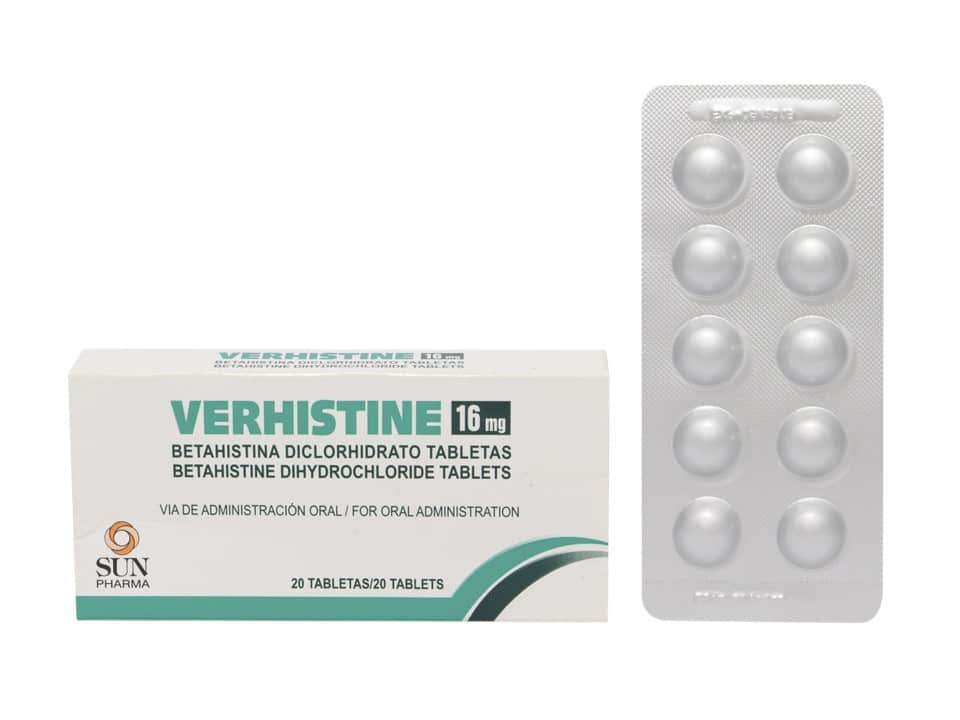Verhistine: What Should You Watch Out For?
Verhistine is a drug used to treat the symptoms of Ménière’s disease, the active ingredient of which is betahistine dihydrochloride.
It is often used to treat the following ailments:
- Feeling dizzy (vertigo)
- Tinnitus
- Losing the ability to hear
- Feeling sick (nausea)
The ingredient in the drug is thought to work by reducing fluid buildup in the inner ear.
Reducing the buildup of fluid in the inner ear helps reduce your incidence and relieve symptoms of Ménière’s disease.
Verhistine comes in tablets and is available by prescription only.

What Will We Learn?
Considerations When Using Verhistine
Most adults 18 years and older can take verhistine.
Verhistine is not suitable for some people.
In the following cases, you should talk to the doctor before using this medicine:
- If you have had an allergic reaction to betahistine dihydrochloride in the drug or to any other drug in the past
- If you have high blood pressure due to an adrenal tumor
- If you have stomach ulcer (Peptic ulcer)
- If you have asthma
How To Use Verhistine?
Betahistine dihydrochloride, the ingredient in the drug, comes in 8 mg or 16 mg tablets daily in most drug models.
Verhistine is also available, which comes in 16 mg tablets.
The usual starting dose for 16 mg tablets is 16 mg taken 3 times a day.
However, this figure is 24 mg in the drug verhistine.
The usual dose is 24 to 48 mg daily.
The dose will be determined by your doctor according to the severity of your disease.
Please take care to use this medicine as often as your doctor recommends.
It’s a good idea to leave 6 to 8 hours between doses.
Once your symptoms are under control, your doctor may start reducing your dose.
It is a good idea to take the tablet with a glass of water after a meal.
This is because you minimize the possibility of upsetting your stomach in this way.
You may need to take verhistine for several months or years to prevent symptoms of Ménière’s disease.
If you forget to take a dose of verhistine, skip the missed dose and take the next dose at your usual time.
Do not take this medicine in 2 doses at the same time.
If you miss a dose, never take an extra dose to make up for it.
Taking too much verhistine can make you feel sick or sleepy, or cause stomach pain.
Verhistine Side Effects
Like all medicines, verhistine can have side effects, but not everyone gets them.
Verhistine is generally a very safe drug.
The side effects listed below may occur with the use of verhistine:
- Feeling sick (nausea)
- Bloating or mild stomach pain
- Indigestion (acid reflux)
- Headache
If you experience any of the side effects, stop using this medicine and contact your doctor immediately.
Pregnancy And Breastfeeding
This medicine is not often recommended during pregnancy because not much is known about how it might affect your baby.
If you are pregnant or trying to have a baby, you should discuss this with your doctor as there may be other treatment options that are better for you.
However, if you have Ménière’s disease that cannot be treated in any other way, your doctor may recommend this medicine during pregnancy.
There is no information on taking this medicine while breastfeeding, but it is likely to pass into breast milk.
Therefore, be careful not to use this medicine during breastfeeding.
In some cases, it should be used during breastfeeding only with the advice of a doctor.
If you need to take this medicine while breastfeeding and you notice that your baby is sick or has diarrhoea, a rash, looks lethargic or not feeding as usual, or if you have other concerns about your baby, contact your pharmacist, doctor or midwife.
There is no evidence to suggest that taking this drug reduces fertility in men or women.
Talk to a pharmacist or doctor before taking this medicine if you are trying to become pregnant.
Other Drugs And Verhistine
Some medicines and verhistine interact with each other and may increase your chance of side effects.
Tell your pharmacist or doctor if you are taking the medicines listed below:
- Medicines called MAO inhibitors used to treat Parkinson’s or depression
- Antihistamines (used for allergies such as hay fever)
Tell your doctor if you are using any medication (including natural remedies).
You may also notice our article on bonadoxina, which is used to treat nausea.
